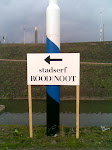Many works of widespread literature earned their notoriety due to the reader's ability to relate to the context, yet Samuel Beckett's Endgame describes the world from the perspective of the most dismal humans on it, or possibly beyond it. Clov embodies a horrible nightmare of static misery that hopefully exceeds the reader's level of understanding. Through his consuming need for order, he erases contentment from his life, anxiously awaiting the last phase of his order, death.
Several times, Beckett describes Clov as having a "very red face" (Beckett 1, 2) in the stage notes. A detail so small, and unaccompanied by intense dialogue that may result in such a feature, must have some sort of significance to its author. Through this simple phrase, Beckett visualizes the life within Clov, although for Clov, life does not equate to living; it is merely the opposite of death and the only obstacle standing between him and his desired death.

.jpg)

